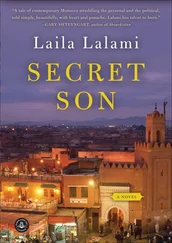Noura pulled her hair up into a ponytail. She took out a pair of lounging pants and a T-shirt from her marble-top dresser, flung them on the bed, and stood, arms akimbo, waiting. “I need to take a shower now.” Larbi scrutinized his daughter’s face, but it was as impassive as a plastic mask. He left the room.
Salma was still napping when he entered their bedroom. He sat on the bed, facing her. Her eyelids fluttered. Without waiting for her to fully awaken, Larbi said, “Noura can’t see this girl anymore.”
“What?” Salma said, opening her eyes. “What are you talking about?” She was already frowning, as though she was ready to analyze the situation and construct the right argument.
“I don’t think it’s a good idea. I caught them talking politics just now.”
“So?”
“Don’t give me that look of yours, Salma. You know exactly what I mean. I don’t want her involved in anything. If someone heard them talking that way about the king at school, there could be trouble.”
Salma sighed and got up. “I think Faten is good for her, frankly. Noura needs to know what’s going on around her.”
“What do you mean?”
“The world doesn’t revolve around fashion and movies.”
“She can look around for herself! What does she need this girl for?”
“Look, Noura’s going to be leaving at the end of the school year anyway, so I doubt they’re going to see each other after that.” Salma adjusted her dress and tightened her belt. “You’re making a mountain out of a seed,” she said. She was the sort of woman who liked to end discussions with a proverb.
Larbi shook his head.
“By the way,” Salma said. “You won’t believe who called this morning. Si Tawfiq, remember him?”
“Of course,” Larbi said, getting up. He had already made up his mind to help him with his niece’s situation. “I’ll give him a call back.”
AS WEEKS WENT BY, Noura seemed to be increasingly absorbed by her books. One Saturday afternoon in October, Larbi asked her if she wanted to go to the theater. The performance was by a stand-up comic who’d been banned for a few years and only recently allowed to perform again. The show was sold out. He thought it would be good if she took a break from all that studying.
“I have to write an essay,” she said. The soft sound of Qur’anic chanting wafted from her CD player.
“You’re missing out,” Larbi replied. This wasn’t the first time Noura had declined an outing. The week before, she had turned down an invitation to go to a tennis finals match, and two weeks before that she had refused to join them at the betrothal of her second cousin. She had always been a good student, but he didn’t understand why she worked so hard now. This was supposed to be an easy year, to improve her English. There would be plenty of time to study next year in New York. “Come on,” he said. “Spend some time with your father for a change.”
“Fine, Baba,” Noura said.
On the way to the theater, Larbi glanced at Noura in the rearview mirror. “You’re not wearing makeup,” he observed.
Salma laughed. “Don’t tell me you cared for her eyeliner.”
“I’m just saying. It’s the theater, after all.”
“Why should I paint my face to please other people?” Noura said indignantly.
Salma pulled down the passenger-side mirror and stared at her daughter in it. “I thought you liked to do it for yourself.”
Noura bit at her unmanicured nails, tilting her head in a way that could have meant yes as much as no, then shrugged.
The comedian’s routine was a mix of biting satire and musical numbers, but although everyone around him laughed, Larbi found he couldn’t relax. He wanted to talk to Noura, though he feared she would again say it was nothing.
The next day, Larbi waited for his daughter to leave for school before slipping into her room, unsure what to look for. The windows were open and the sun was making tree spots on the floor. Larbi sat on his daughter’s bed. It struck him that it was made, the crocheted cover pulled neatly on all sides. She had always been messy, and he’d often joked that he’d need a compass to find his way out of her room. Now he felt silly for finding her sudden neatness suspicious. Salma was right, he worried for no reason. He got up to leave, but the garish color of a paperback on the nightstand caught his eye and he reached for it. It was a book on political Islam. Leafing through it, he saw that the print quality was poor and that the text was littered with typographical errors. How could Noura bother with this? He tossed it back on the nightstand, where it hit another tome, this one a leather-bound volume. Larbi tilted his head sideways to read the spine. It was Ma’alim fi Ttariq by Sayyid Qutb, the Egyptian dissident and member of the Muslim Brotherhood. He doubted that Noura, who’d been schooled at Lycée Descartes, could even read the complicated classical Arabic in a book like that, but its presence on her nightstand made him look frantically around the room for other clues. Next to her stereo he found a stack of tapes, and when he played one it turned out to be a long commentary on jurisprudence, peppered with brief diatribes about the loose morals of young people. He couldn’t find anything else out of the ordinary.
When Noura came home for lunch he was waiting for her in the living room. “What’s this?” he asked, holding up the Sayyid Qutb book.
“You were looking through my things?” Noura said, looking surprised and hurt.
“Listen to me. I’ll only say this once. You’re not to see this girl Faten any longer.”
“Why?”
“I don’t like what she’s doing to you.”
“What is she doing to me, Baba?”
“I don’t want that girl in my house anymore. Safi!”
Noura gave him a dark look, turned on her heel, and left the room. When the maid served lunch, Noura said she wasn’t hungry. Larbi didn’t mind. Better a sulking child than one who gets in trouble.
IT WAS ONLY A few weeks later, the day before Ramadan, that Noura made her announcement. Salma was shuffling back and forth from the kitchen, where the maid was roasting sesame seeds in the oven for the briwat pastries she would make for the holy month. Larbi was looking at pictures Nadir had sent of the apartment he’d just moved into with a friend, and he was more amused than upset to see no trace of the laptop the boy had claimed he needed.
“You’re spoiling him,” Salma said.
“He’s going to get a master’s degree,” Larbi replied.
Noura walked into the dining room and sat down at the breakfast table. “I’ve decided to start wearing the hijab.” Salma reached for her daughter’s hand and knocked over her cup of coffee. She pushed her chair away from the table and used her napkin to blot the stained tablecloth.
“What? Why?” Larbi asked, dropping the pictures on the table.
“Because God commands us to do so. It says so in the Qur’an,” Noura replied.
“Since when do you quote from the Qur’an?” he said, forcing himself to smile.
“There are only two verses that refer to the headscarf. You should take them in context,” her mother argued.
“Don’t you believe that the Qur’an is the word of God?” Noura asked.
“Of course we do,” said Larbi, “but those were different times.”
“If you disagree with the hijab, you’re disagreeing with God,” she said.
The confident tone in her voice scared him. “And you have a direct phone line to God, do you?” he said.
Salma raised her hand to stop Larbi. “What has gotten into you?” she asked her daughter. Noura looked down. She traced the intricate geometric pattern on the red rug with her big toe. “Those verses refer to modesty,” Salma continued. “And besides, those were the pagan times of jahiliya, not the twenty-first century.”
Читать дальше












